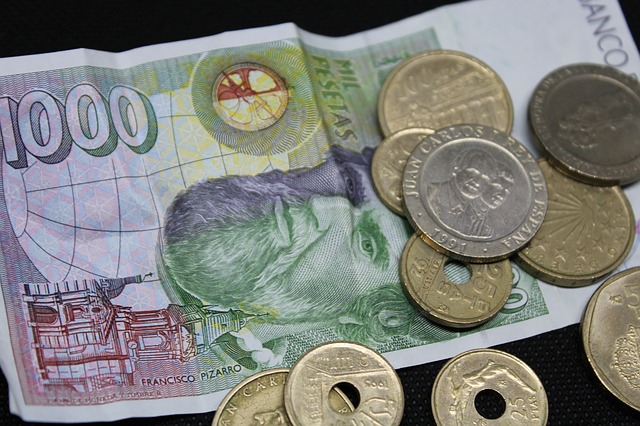
The Most Amazing Ultimate Vocab Guide to Money in Spanish
“Show me the money!”
That famous quote from Jerry Maguire, a film starring Tom Cruise and Cuba Gooding Jr., encapsulates the spirit of this article. Let’s learn about money in Spanish!
You deal with money day in and day out. You pay bills and taxes, and charge for your services or products. Maybe you give an allowance to your children or motivate them to open a lemonade stand in your front yard. The point is that you can’t hide from money. We all need it, and we all want it (some people more than others), but the reality is that we all have to deal with money.
In this post, you’ll learn some useful vocabulary related to money, a few slang terms for money in Spanish, and five popular idioms about the subject.
Why Is It Important to Learn About Money in Spanish?
Whether we like it or not, money plays a role in our lives. We use it every single day in innumerable different ways, to buy a drink, pay the rent, or book a flight. Money is everywhere, and this is also true in Spanish-speaking countries.
If you are planning a vacation in a sunny Mexican beach town, you will need to know a few words about money in Spanish, at least to pay for your food or to book a tour. You definitely need to know the local currency. Or perhaps you are looking to invest in Latin America. In that case, you will need to take a look at the region’s stock markets.
The list of situations involving money is endless, and that’s why it’s important to know some basic terms about money in Spanish.

Money in Spanish: Vocabulary
Now that we’ve established the importance of communicating about money in Spanish, let’s study some basic vocabulary.
Money Vocabulary
| English | Spanish |
| Money | El dinero |
| Bill / Banknote | El billete |
| Coin | La moneda |
| Cash | El efectivo |
| ATM / Cash machine | El cajero automático |
| Check / Bill | La cuenta |
| Till / Cash register | La caja |
| Discount | El descuento |
| Wallet | La cartera / La billetera |
| Price | El precio |

Exchange Vocabulary
| English | Spanish |
| Currency | La moneda |
| Foreign exchange | Las divisas |
| Change | El cambio |
| Exchange rate | El tipo de cambio |
| Traveler’s check | El cheque de viajero |
| Comission | La comisión |
| Dollar | El dólar |
| Pound | La libra |
| Euro | El euro |
| Yen | El yen |
| Stock market | La bolsa (de valores) |
| Shares | Las acciones |
Banking Vocabulary
| English | Spanish |
| Bank | El banco |
| Bank account | La cuenta bancaria |
| Credit card | La tarjeta de crédito |
| Debit card | La tarjeta de débito |
| Check | El cheque |
| Bank balance | El saldo |
| Mortgage | La hipoteca |
| Interest | El interés |
| Debt | La deuda |
| Fee | La cuota |
| Tax | El impuesto |
| Loan | El préstamo |

Money-related Verbs in Spanish
| English | Spanish |
| To buy | Comprar |
| To sell | Vender |
| To pay | Pagar |
| To charge | Cobrar |
| To earn | Ganar |
| To invest | Invertir |
| To save | Ahorrar |
| To lend | Prestar |
| To borrow | Pedir prestado |
| To lose | Perder |
| To spend | Gastar |
Money Phrases
¿Cuál es el tipo de cambio?
What’s the exchange rate?
¿Qué comisión cobran?
How much commission do you charge?
¿Cuánto cuesta?
How much does it cost?
¿Cuál es el precio?
What’s the price?
¡La cuenta por favor!
Check, please!
Quiero abrir una cuenta bancaria.
I want to open a bank account.
¿Cuál es el sueldo?
What’s the pay (salary)?
¿Dónde hay un cajero automático?
Where is the ATM?
¿Aceptan tarjeta de crédito?
Do you accept credit cards?

Different Ways to Say Money in Spanish
Every country has their own slang terms for money. Think in the American “bucks” or the British “quid.” The same thing happens in Latin America and Spain, so let’s take a look at some of the most popular slang terms for money in Spanish-speaking countries.
Pasta
Used mostly in Spain, pasta in this context means “money” and just like money, it has no plural. You can’t say pastas; it doesn’t make any sense. The literal meaning of pasta, of course, is “dough.” How it came to mean money, it’s hard to tell for sure.
Lana
As with pasta, lana doesn’t have a plural. It’s another term for money, and it’s used mainly in Mexico. The literal meaning of lana is “wool,” and you can imagine a past age when having sheep meant having a lot of money because of the value of their lana.
Plata
The literal translation of plata is “silver.” This term is widely used in Argentina, Bolivia, Chile, and Peru and understood in most Spanish-speaking countries. The origin of this term is clearer than the others, as coins were made of silver in the not-so-distant past.
Harina
This is a term that personally I had never heard before, but its use is extended throughout Costa Rica and neighboring countries of Central America. The word harina literally translates as “flour.”
Feria
Feria is another Mexican slang term for “money.” However, feria actually means “fair,” as in a festival or theme park. In the context of money, feria usually refers to loose change and small coins, but it can also be used to simply refer to money. For example, you could say ¿cuánta feria tienes?, “how much money do you have?”.
Money in Spanish: Idioms
Idioms can be defined as “a manner of speaking that is natural to native speakers of the language.” They don’t mean exactly what their words seem to be expressing, as when you say in English, “it’s raining cats and dogs.” Of course, you don’t mean precisely that (I hope!), but it’s a phrase that makes sense in the English-speaking world due to the cultural context.
El Tiempo Es Oro
This is the Spanish version of the English phrase attributed to Benjamin Franklin “time is money.” In Spanish, you can use the literal translation el tiempo es dinero, but it’s more common to hear people saying el tiempo es oro, or “time is gold.”
In any case, the meaning is clear: don’t waste your time! Time is your most prized possession; if used wisely it can produce a lot of money or gold.
Tirar la Casa por la Ventana
In English you would say something like “to spare no expense.” However, the literal translation is really fun: “to through the house through the window.” What an image! The point is that you tiras la casa por la ventana when you have a big celebration and spare no expenses. That huge wedding by the beach with mariachi and hundreds of guests? Yeah, you probably threw your house through your window then.
Poderoso Caballero Don Dinero
“Powerful Gentleman that Mr. Money.” I like this one because it rhymes, showing imagination and creativity. It basically means “money talks.” When people have money, they usually get their way. The idea of money talking is funny, but a banknote wearing a smoking jacket and walking down Wall Street as a powerful gentleman is even funnier.
No Todo lo que Brilla Es Oro
Literally “not everything that shines is gold,” this idiom is translated as “all that glitters is not gold.” It means that not everything that seems to be good ends up actually being good. Things are not always what they seem to be at first glance, so be careful.
Tiene Más Lana que un Borrego
If you connect this idiom with the slang term lana I mentioned before, it makes more sense. It literally means “it has more wool than a sheep,” but you now know that lana also means money, so it’s playing with the double meaning of this word. The actual meaning of the idiom is that someone has a lot of money.
What Do You Think About Don Dinero?
Let us know how you feel about this new vocabulary, slang terms, and idioms about money in Spanish. I simply love the image of Don Dinero. Let me know which one is your favorite. Leave a comment below and join the conversation!

Join one of the 40,000 classes that we teach each month and you can experience results like these

“This is the best way for your kid to learn Spanish. It’s one-on-one, taught by native Spanish speakers, and uses a curriculum.”
– Sharon K, Parent of 3

“It’s a great way to learn Spanish, from native Spanish speakers in a 1-on-1 environment. It’s been fairly easy to schedule classes around my daughter’s other classes. The best value for us has been ordering multiple classes at a time. All the instructors have been great!”
– Cindy D, Parent of 3

“HSA offers very affordable, quality, one on one classes with a native speaker. My son has greatly benefited from taking classes. We have seen his confidence increase as well as his pronunciation improve, because he learns from a native Spanish speaker. HSA has quick, personal customer service. Our family has been very pleased with our experience so far!”
– Erica P. Parent of 1
Want to learn more about Spanish in different countries? Check out these posts!
- Top 20 Guatemalan Words and Slang Expressions You Should Know
- Bien vs Bueno: How Good is Your Spanish?
- How to Talk About Learning a Language in Spanish
- Señora vs Señorita: Who Is She?
- Learn These 20 Types of Fish in Spanish [+ More Vocab]
- 200+ Beginner Spanish Vocabulary Words PDF: Learn Spanish Fast!
- The Most Extensive Guide Ever to House Vocabulary in Spanish
- ‘How Much Is It?’ in Spanish: A Guide to Travel and Shopping
- A Guide to Double Negatives in Spanish - December 18, 2024
- Señora vs Señorita: Who Is She? - October 9, 2024
- How to Use the Past Participle as an Adjective in Spanish - October 3, 2024





